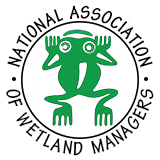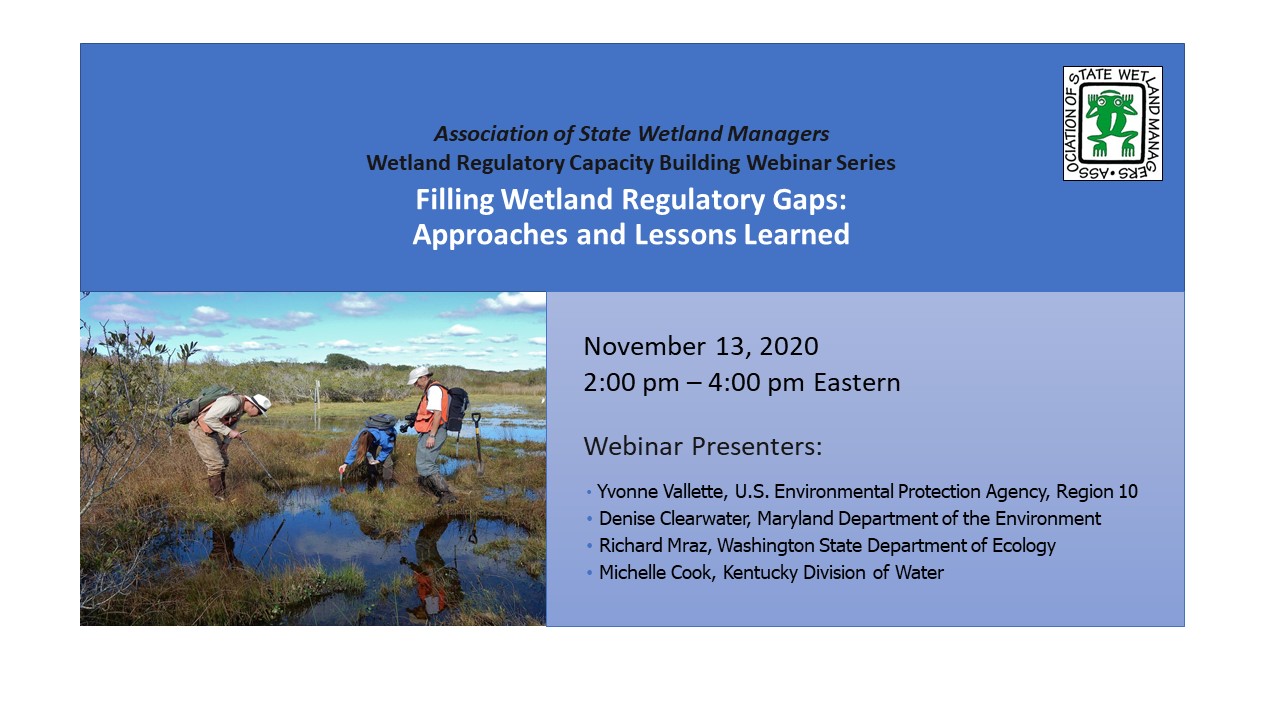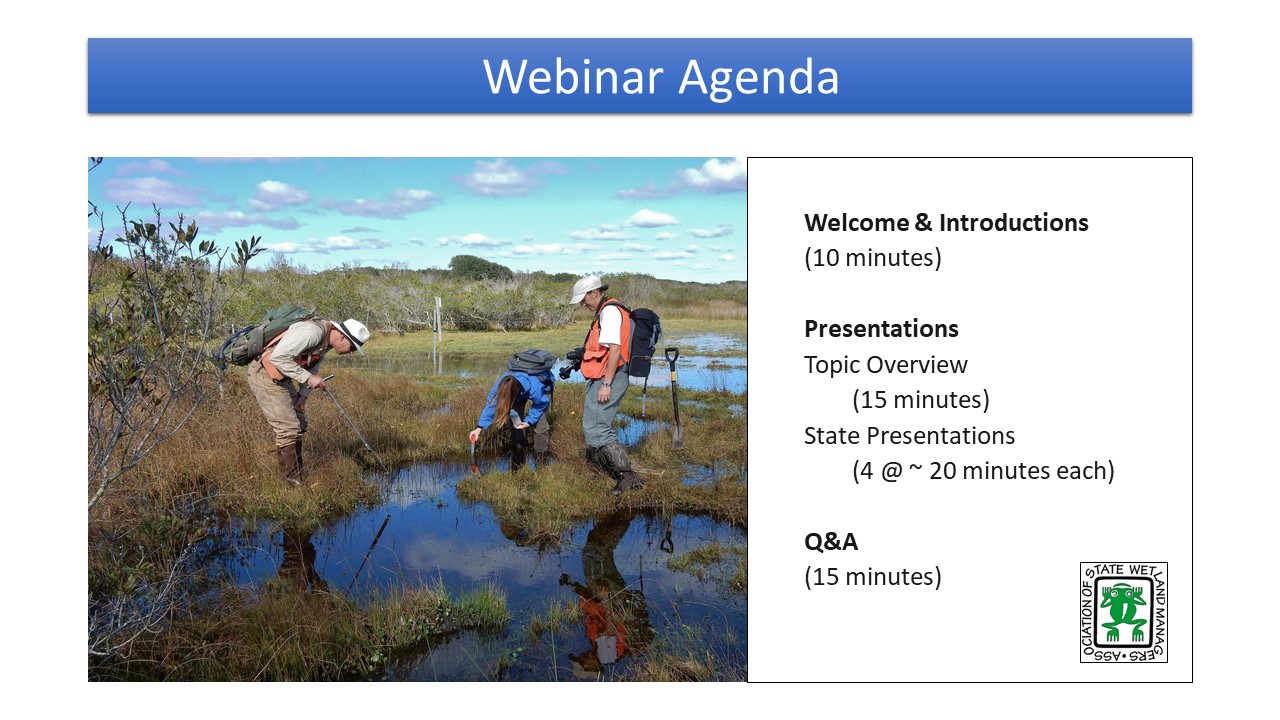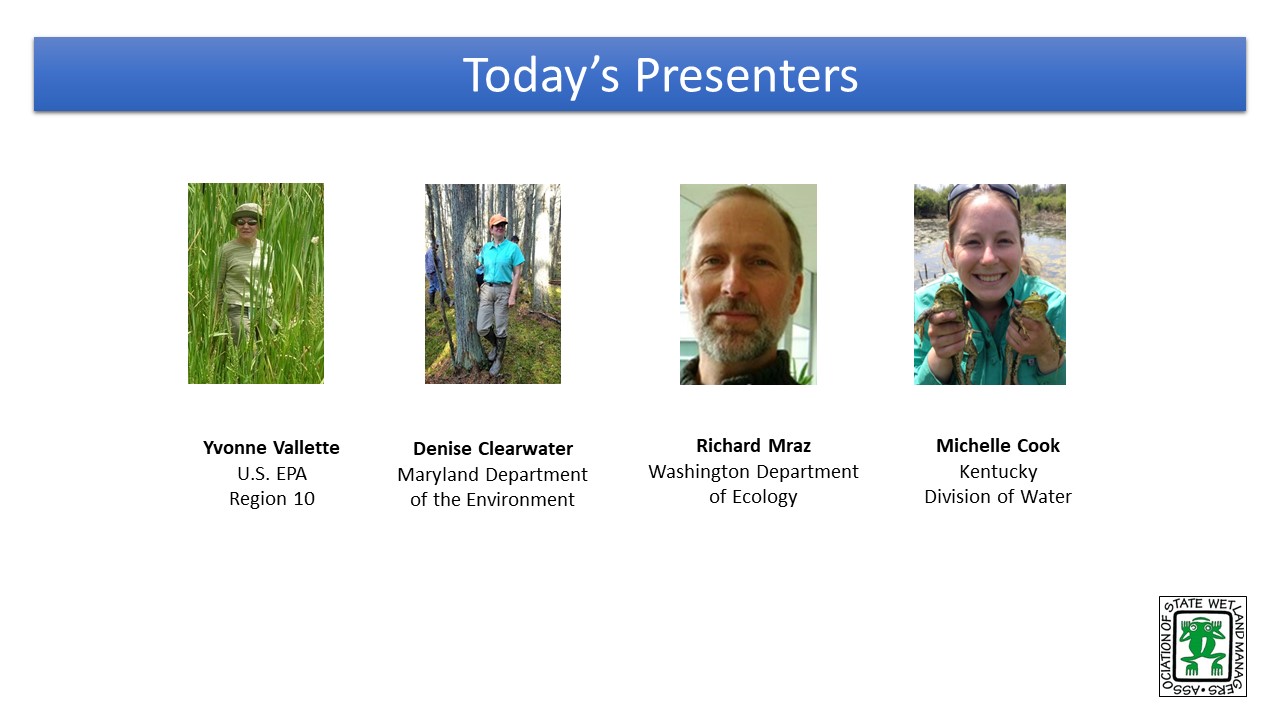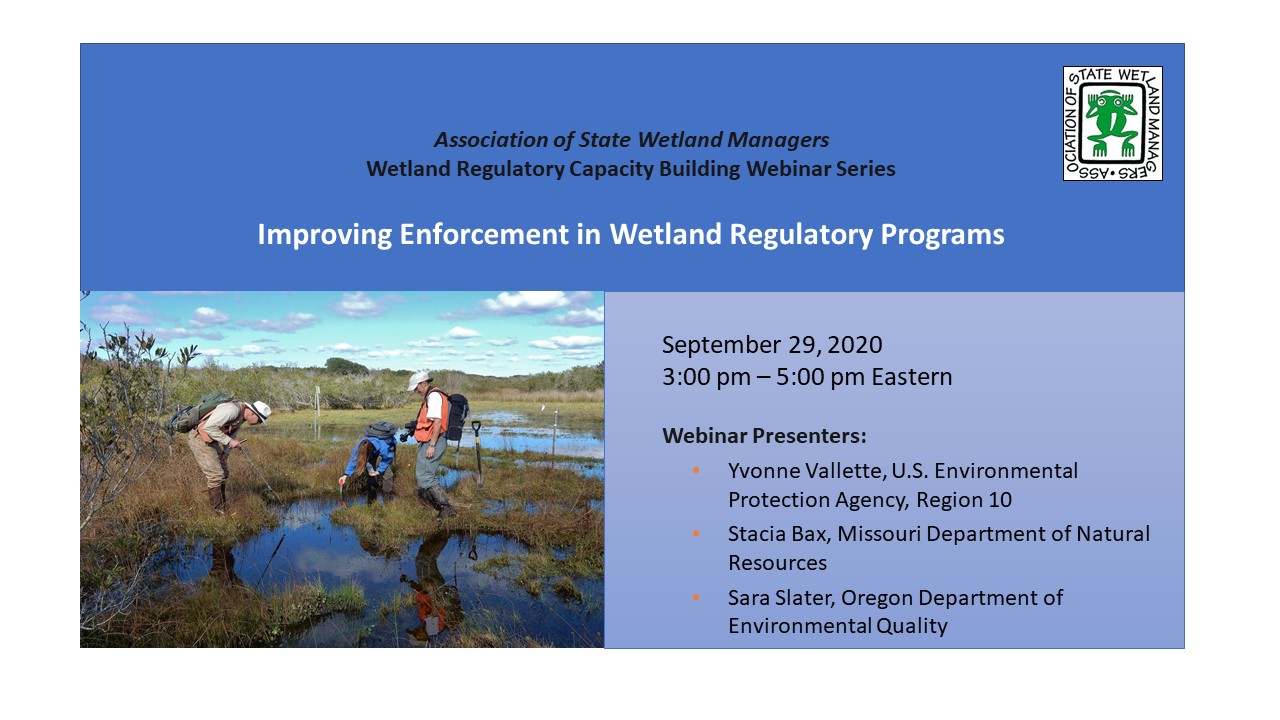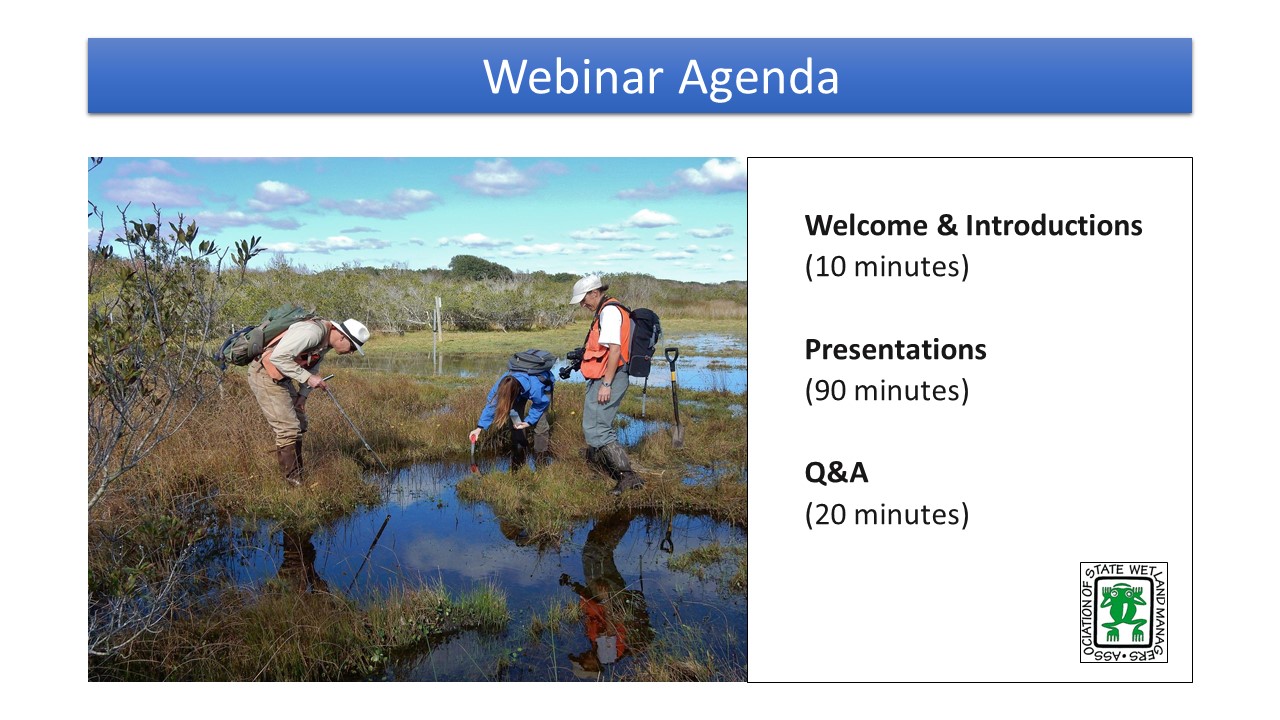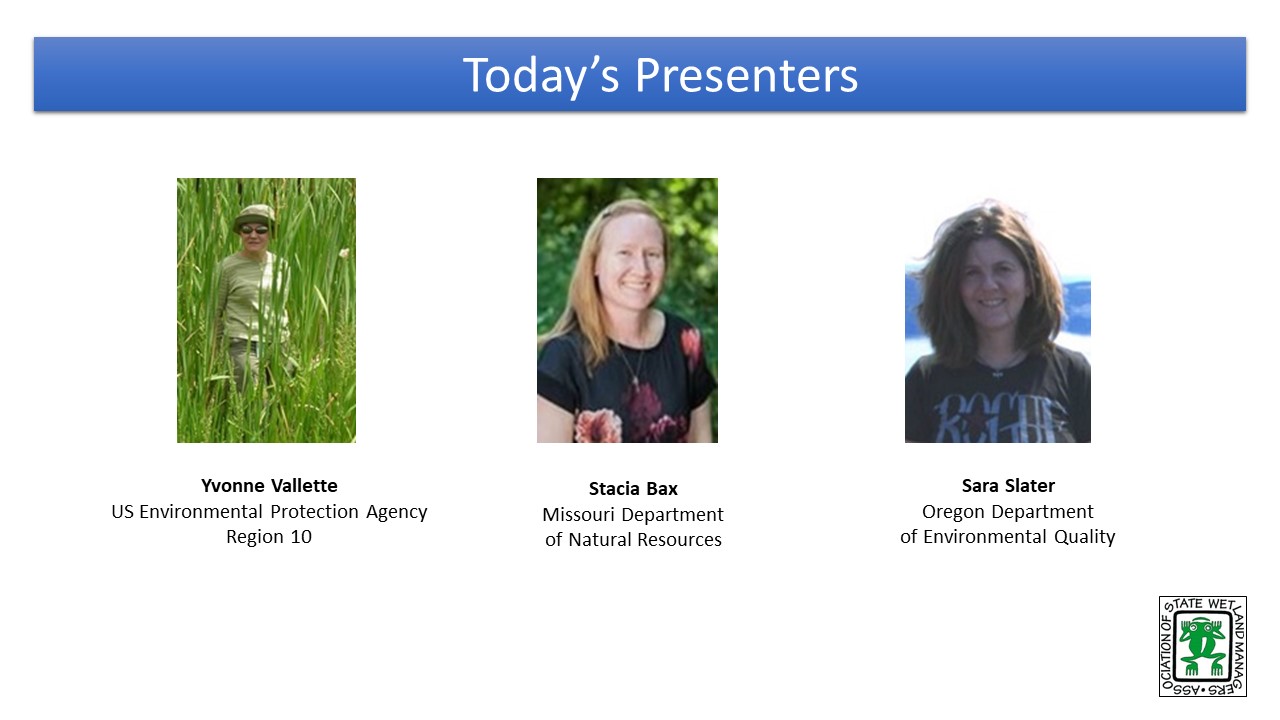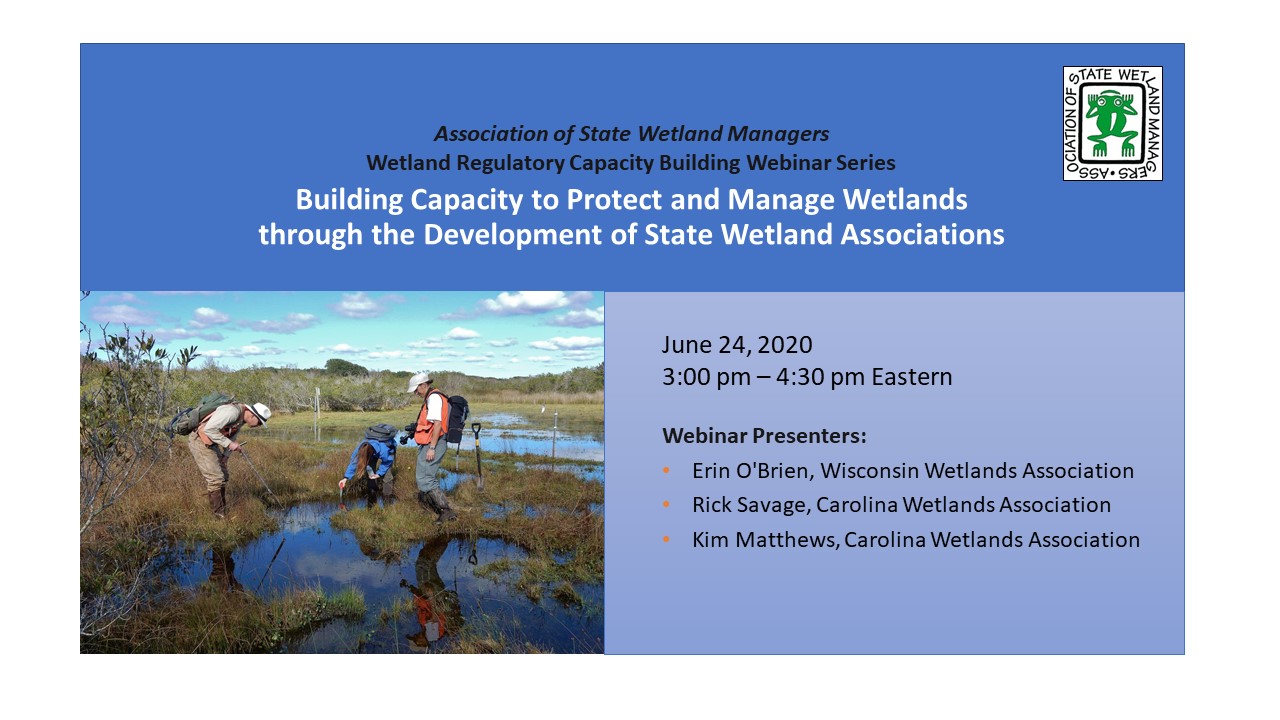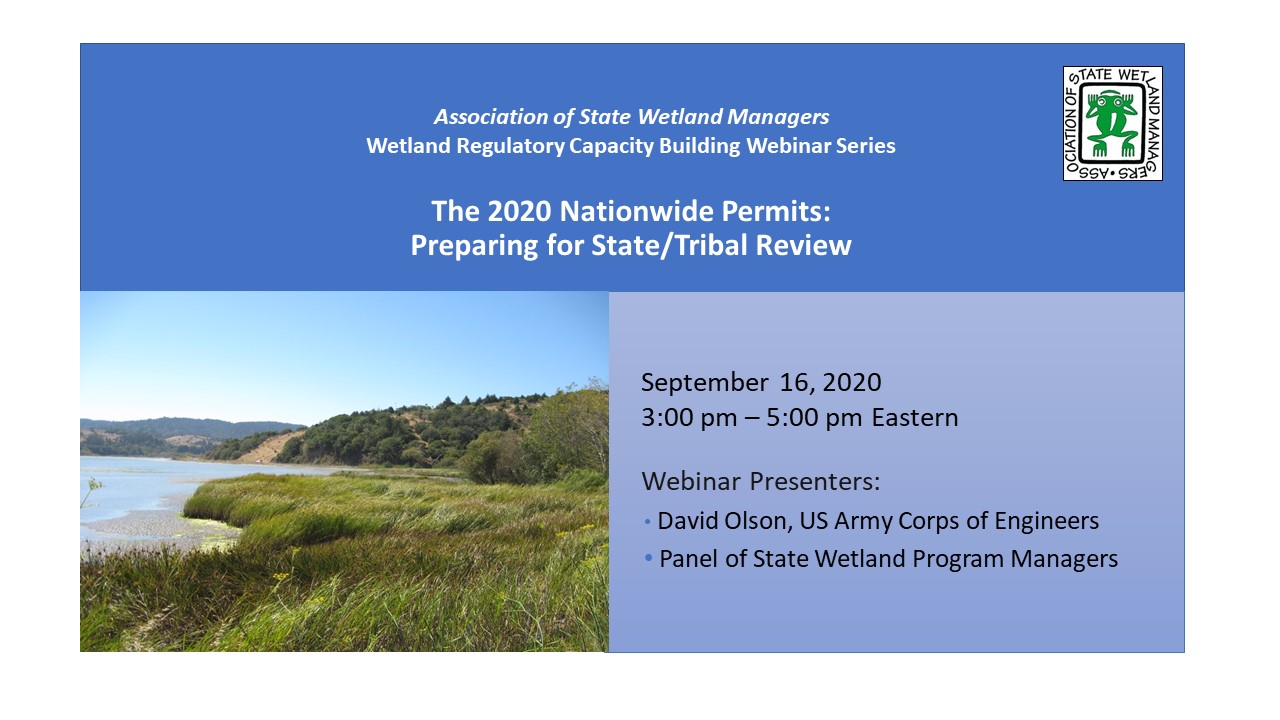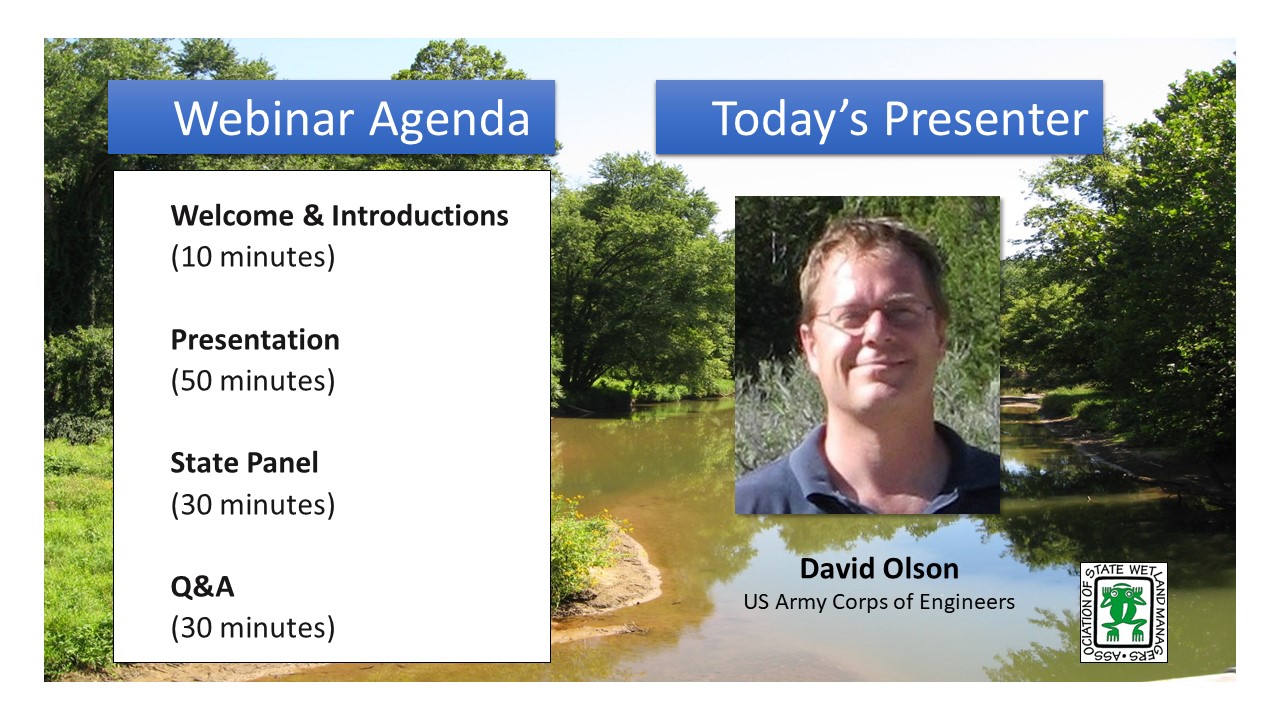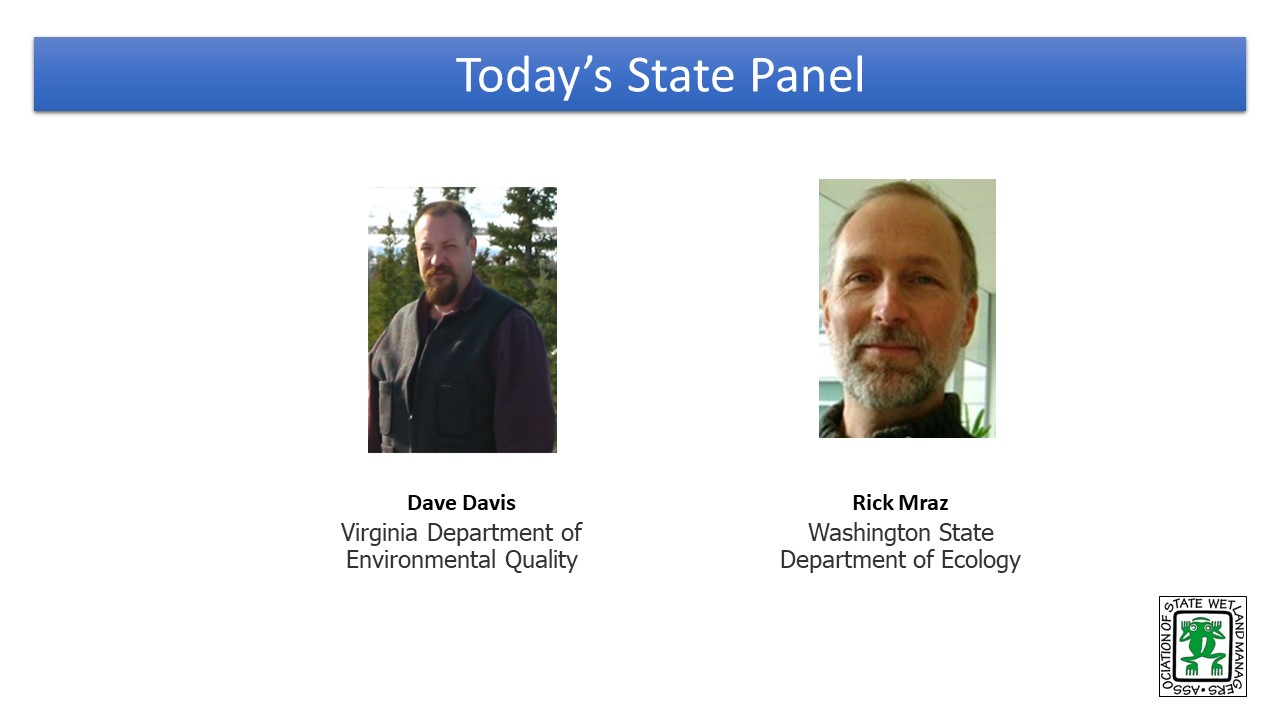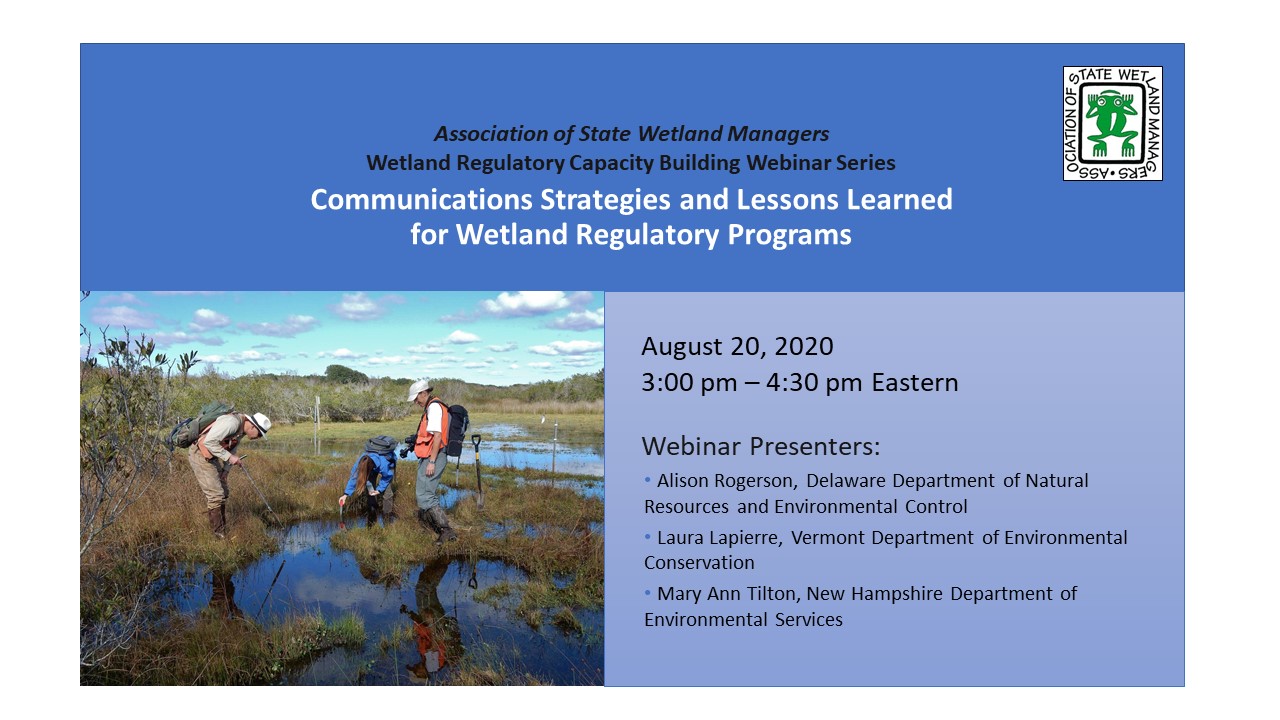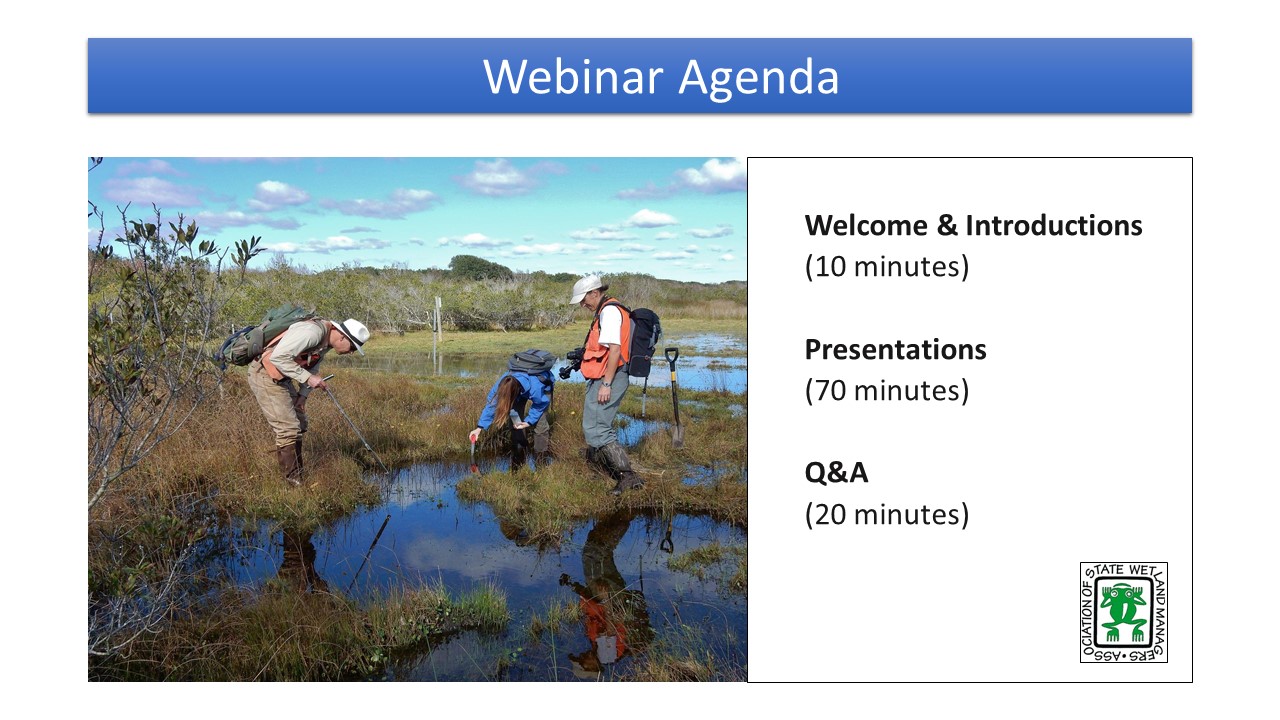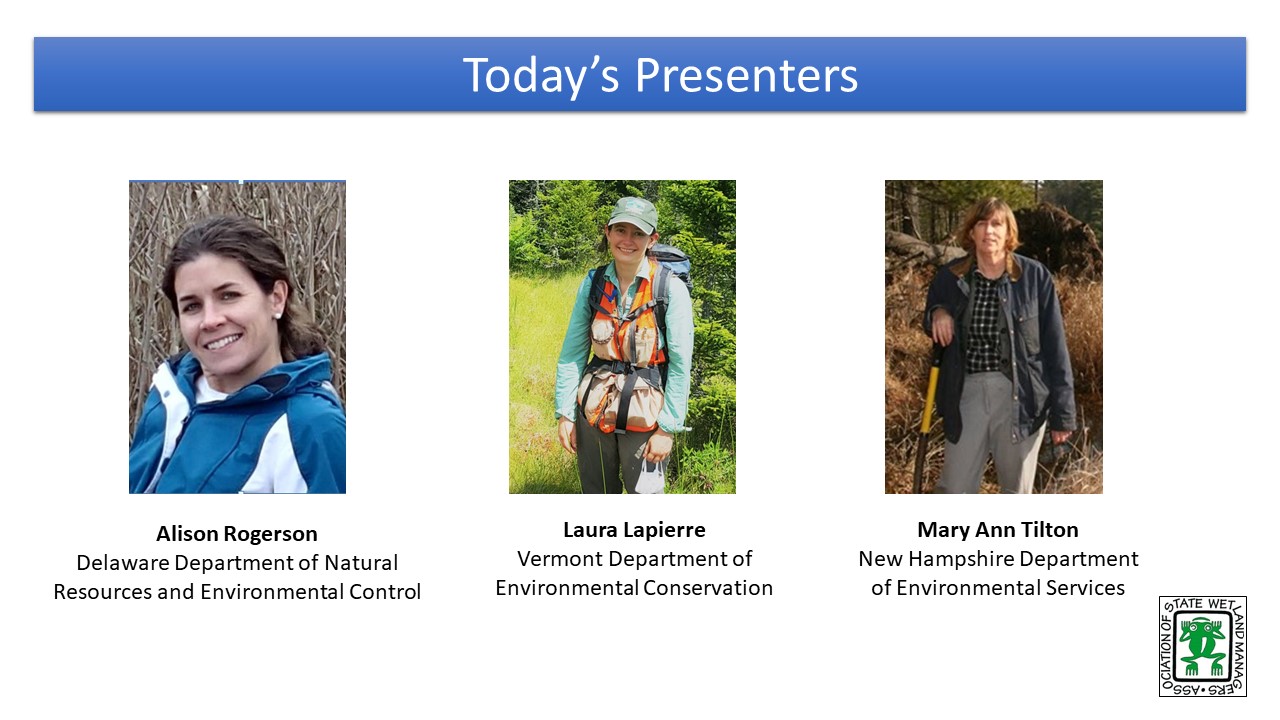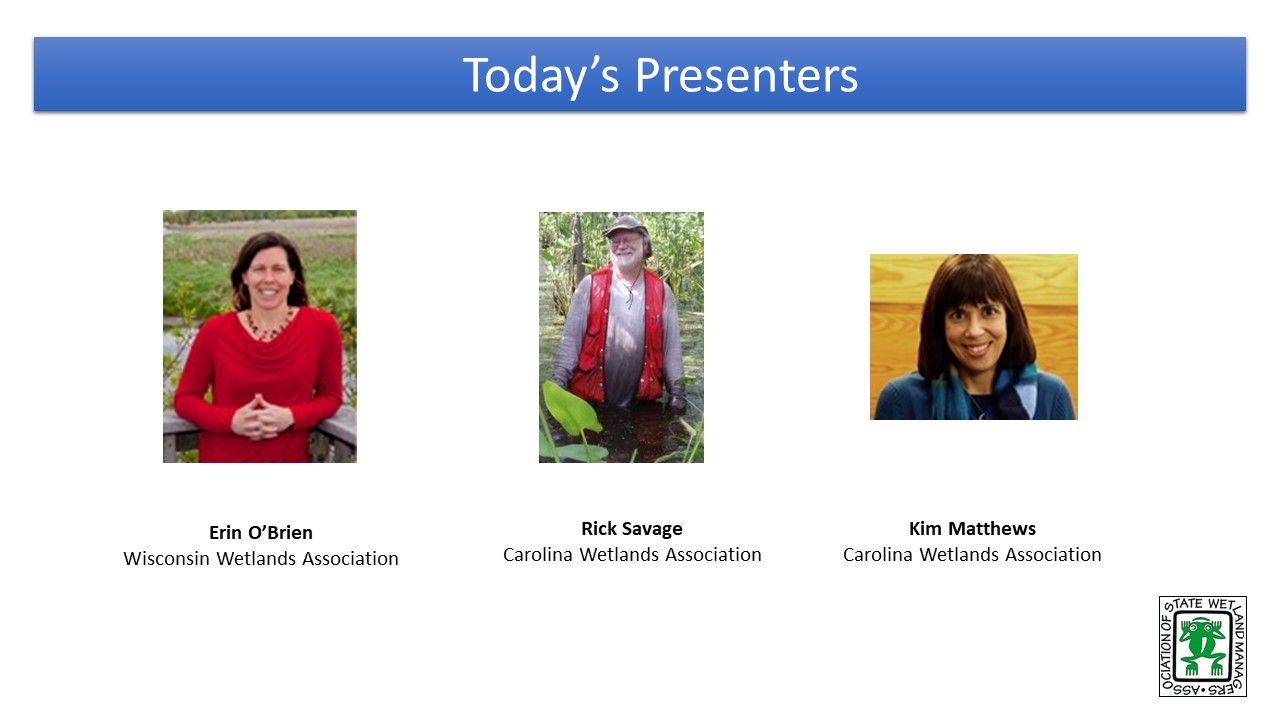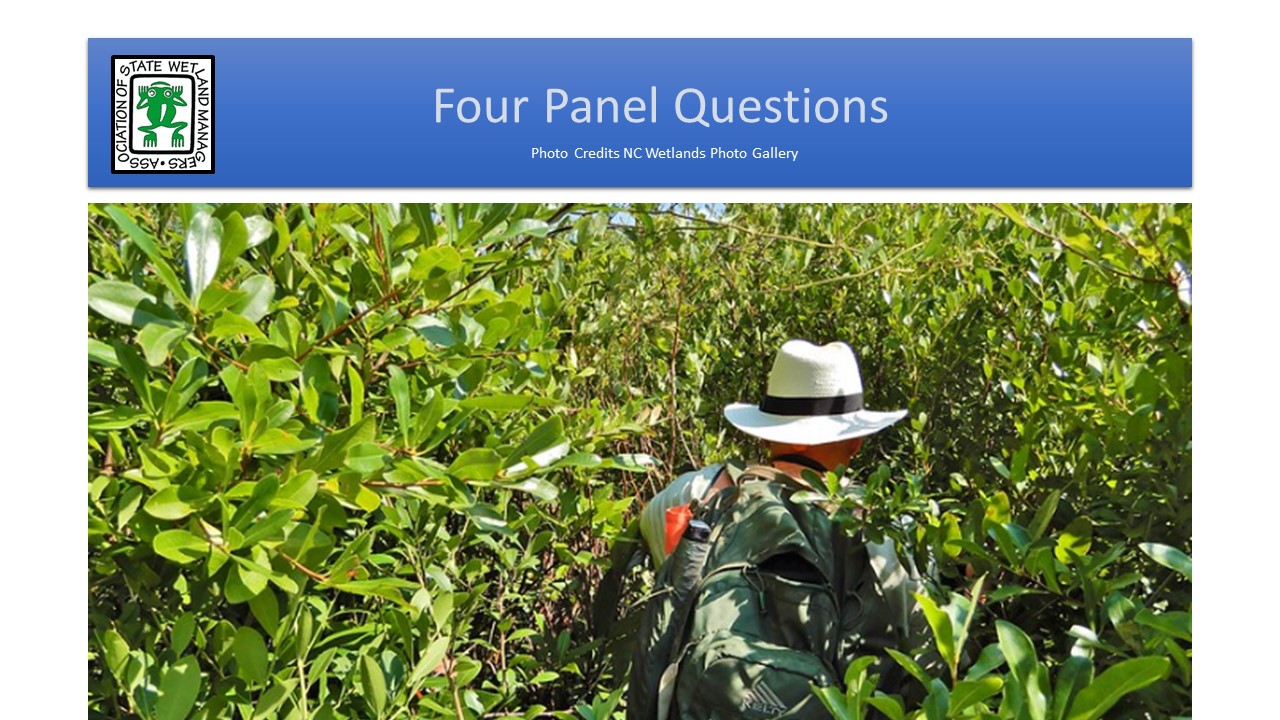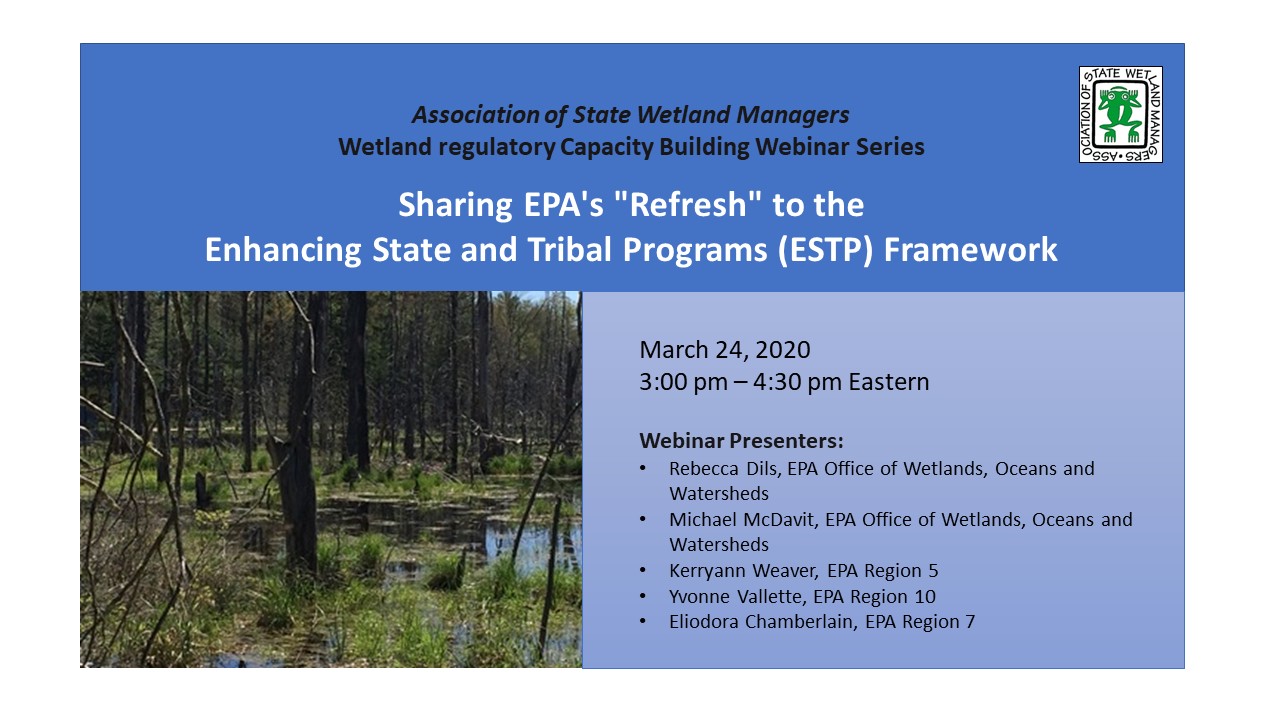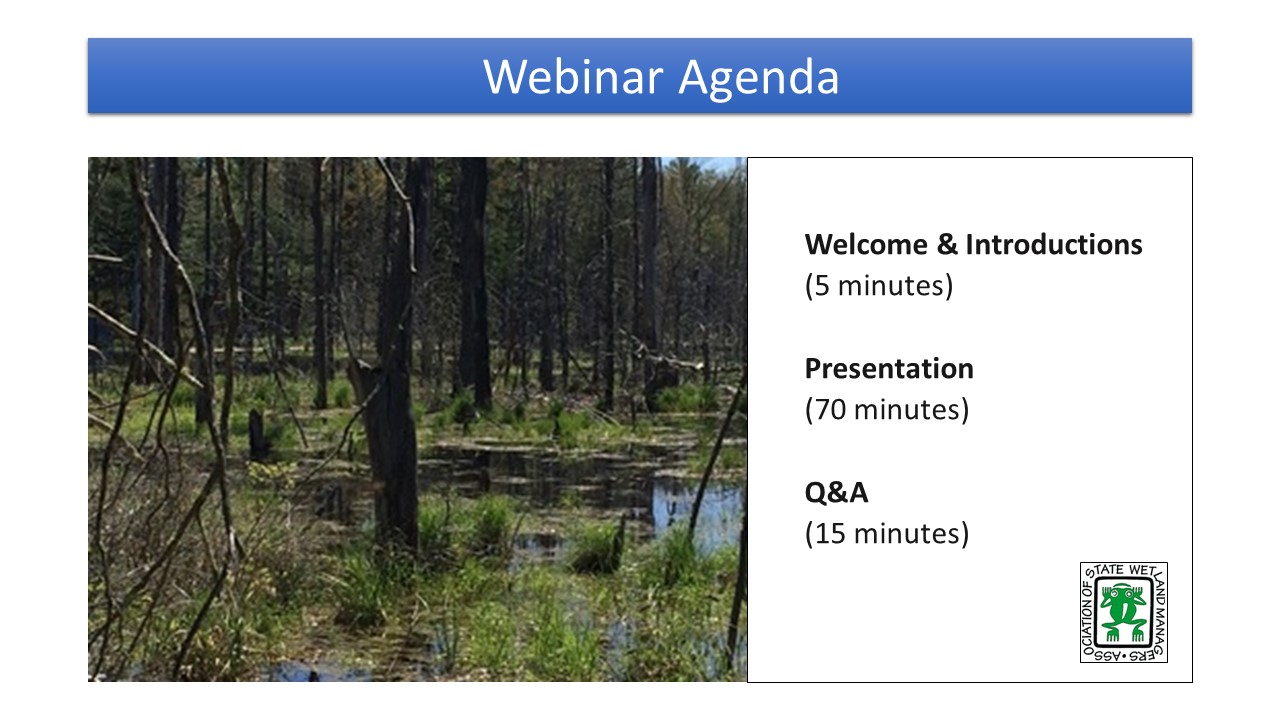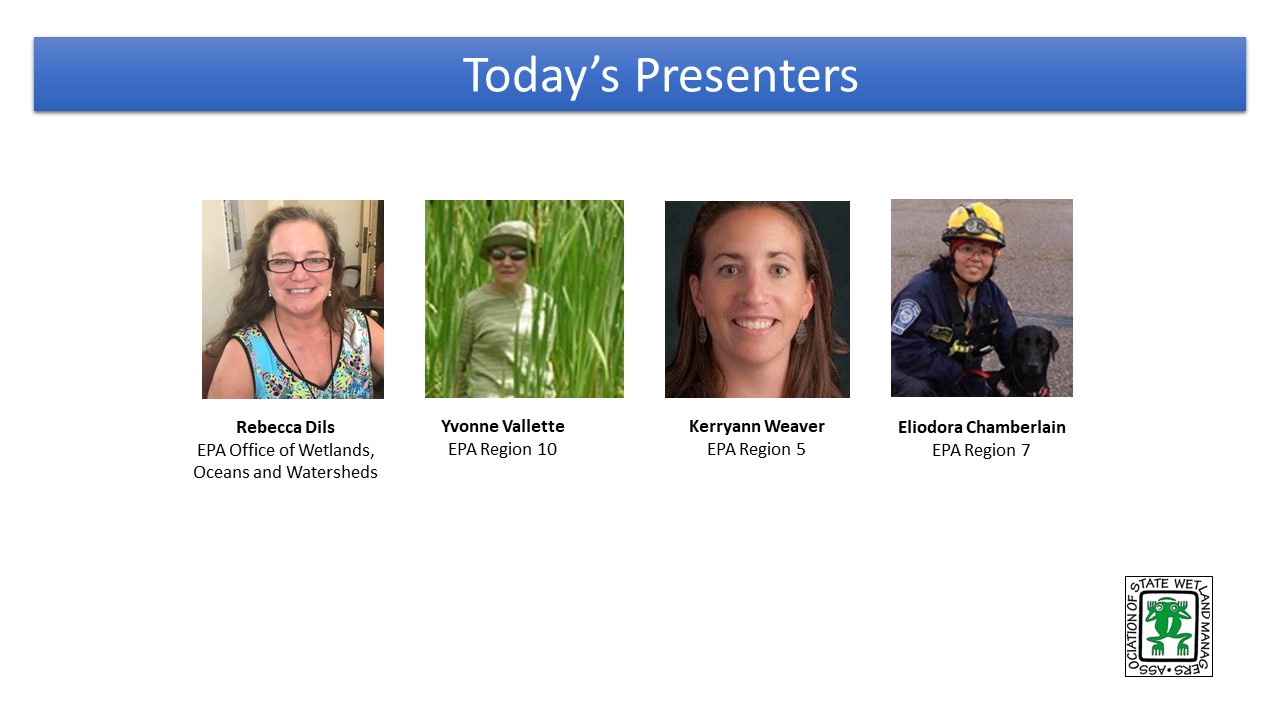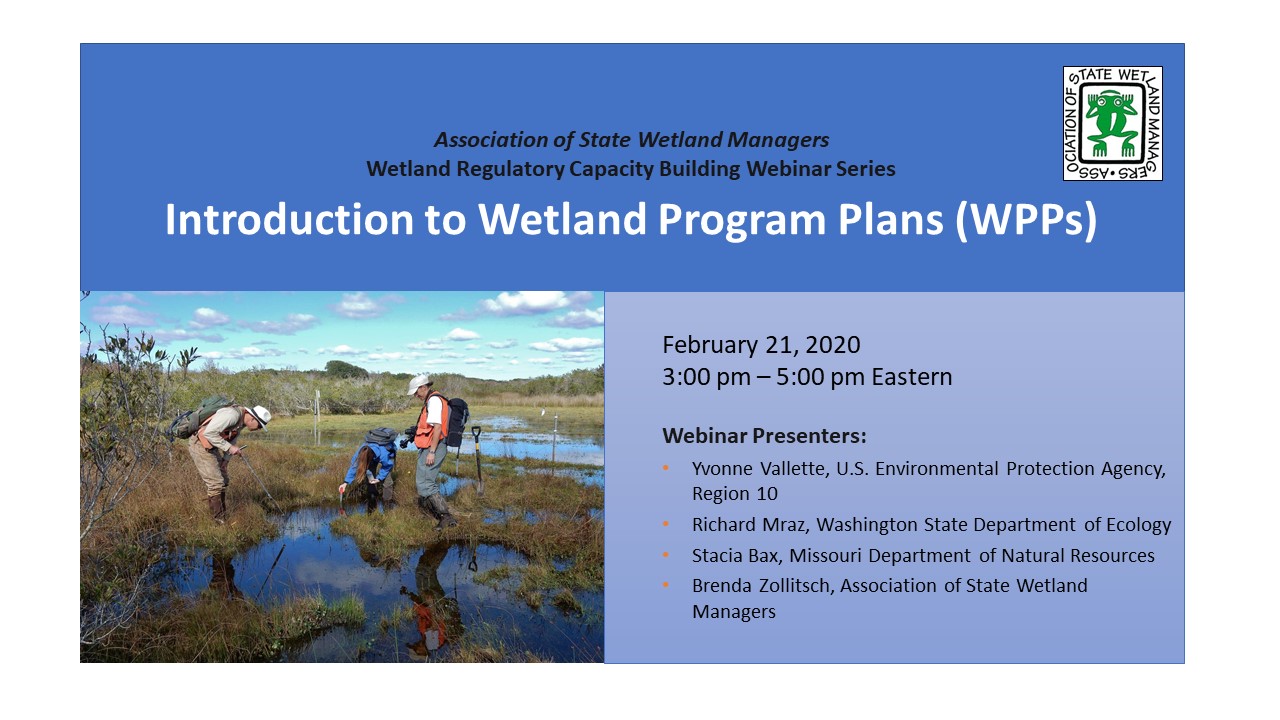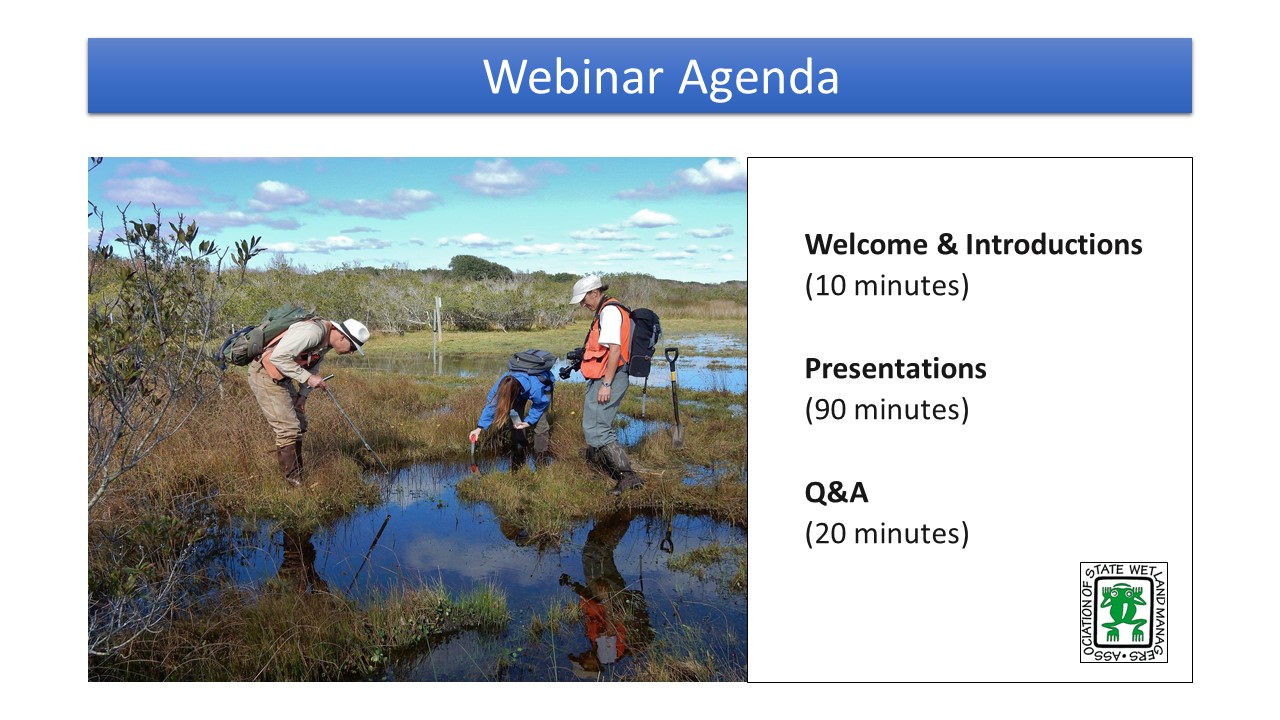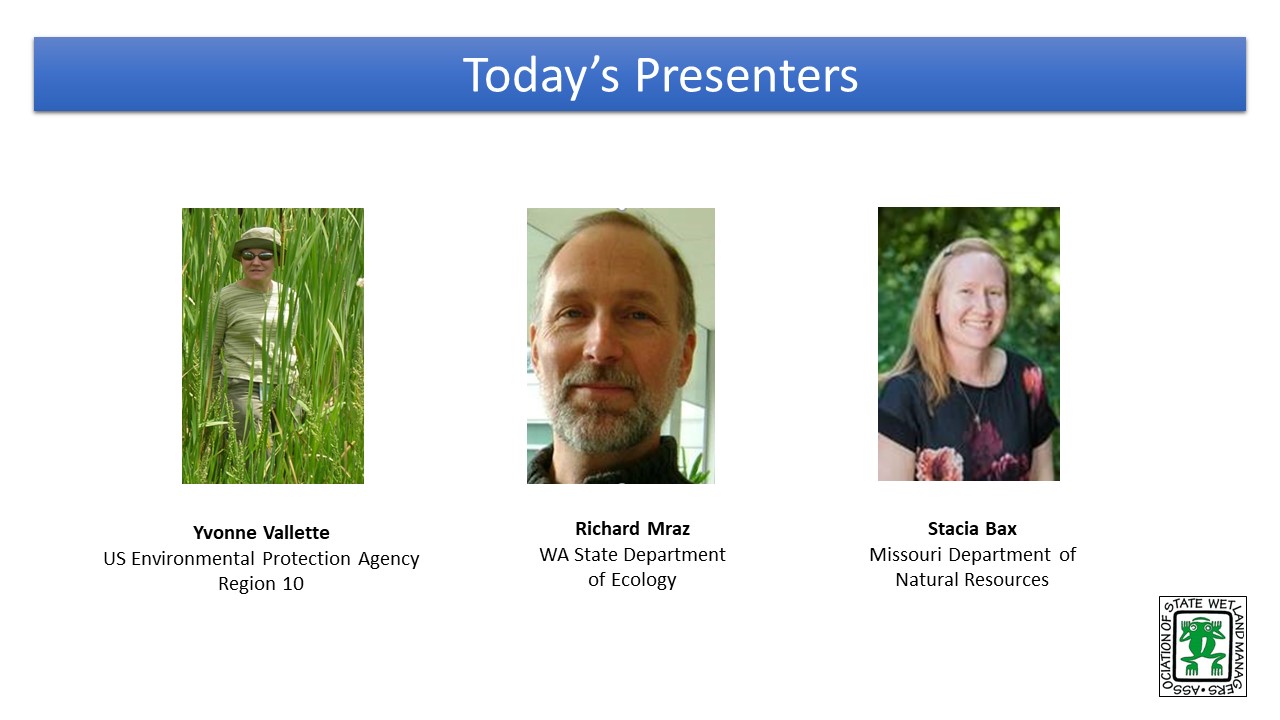Filling Wetland Regulatory Gaps: Approaches and Lessons Learned
Held Friday, November 13, 2020 - 2:00 pm-4:00 pm Eastern ![]()
INTRODUCTION
- Brenda Zollitsch, Senior Policy Analyst, Association of State Wetland Managers [POWERPOINT PRESENTATION]
PRESENTERS
- Yvonne Vallette, U.S. Environmental Protection Agency, Region 10 [POWERPOINT PRESENTATION]
- Denise Clearwater, Maryland Department of the Environment [POWERPOINT PRESENTATION]
- Richard Mraz, Washington State Department of Ecology [POWERPOINT PRESENTATION]
- Michelle Cook, Kentucky Division of Water [POWERPOINT PRESENTATION]
ABSTRACTS
This webinar discussed the reasons that regulatory gaps emerge and some of their drivers. Not all states are the same, so the first presentation explores these gaps and options for developing wetland regulatory programs or program elements to fill them. The webinar covered different regulatory regimes at various levels of government. The webinar then move on to examples of wetland regulatory building work in three states (Washington State, Maryland and Kentucky). States shared their regulatory capacity building experiences, explore their drivers for change, what gaps needed to be filled, and the processes they undertook internally to make decisions about their capacity building efforts. The panelists talked about the resources and conditions that were required to make these changes happen. State panelists discussed their outputs and outcomes, sharing what was created, what it has taken to implement it, and what resulted from their efforts. Each panelist ended by answering whether they were able to fill their regulatory gap.
BIOS
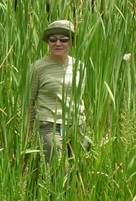 Yvonne Vallette is an Aquatic Ecologist with the U.S. Environmental Protection Agency (EPA). For the last twenty-three years she has worked at EPA Region 10’s Oregon Operations Office in Portland serving as the Region’s coordinator for enhancing State and Tribal Programs. Her work with EPA is focused on the technical and policy aspects of the Clean Water Act (CWA), including Section 404. Her practicable experience includes work in: aquatic resource monitoring and assessment, 404 enforcement, compensatory mitigation, impact analysis, CWA jurisdiction, 404 program assumption, and aquatic resources restoration.
Yvonne Vallette is an Aquatic Ecologist with the U.S. Environmental Protection Agency (EPA). For the last twenty-three years she has worked at EPA Region 10’s Oregon Operations Office in Portland serving as the Region’s coordinator for enhancing State and Tribal Programs. Her work with EPA is focused on the technical and policy aspects of the Clean Water Act (CWA), including Section 404. Her practicable experience includes work in: aquatic resource monitoring and assessment, 404 enforcement, compensatory mitigation, impact analysis, CWA jurisdiction, 404 program assumption, and aquatic resources restoration.
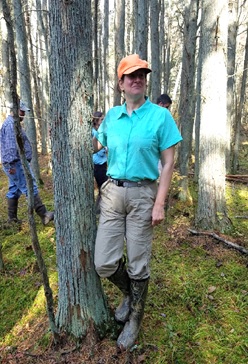 Denise Clearwater has worked in Maryland’s wetland programs since 1986. She has a background in developing and implementing programs in wetland regulation, wetland training, and mitigation, as well as managing special projects for grants and program improvement and assisting in policy development. She has represented the Wetlands and Waterways Program in the Maryland Department of the Environment on numerous interagency work groups for regulatory, wetland monitoring, restoration, preservation and stream health and is a past co-chair of the Chesapeake Bay Program Wetland Work Group. She is also a member of the Society of Wetland Scientists. Denise has a B.S. in zoology from the University of Maryland and an M.S. in wildlife management from Frostburg State College (now University).
Denise Clearwater has worked in Maryland’s wetland programs since 1986. She has a background in developing and implementing programs in wetland regulation, wetland training, and mitigation, as well as managing special projects for grants and program improvement and assisting in policy development. She has represented the Wetlands and Waterways Program in the Maryland Department of the Environment on numerous interagency work groups for regulatory, wetland monitoring, restoration, preservation and stream health and is a past co-chair of the Chesapeake Bay Program Wetland Work Group. She is also a member of the Society of Wetland Scientists. Denise has a B.S. in zoology from the University of Maryland and an M.S. in wildlife management from Frostburg State College (now University).
 Richard Mraz is the Wetland Policy Lead for the Washington Department of Ecology. He is a certified Professional Wetland Scientist who began his career in the wetlands field in Lee County, Florida in 1987. He has worked as a naturalist, field biologist and environmental planner with local, state and federal agencies since 1980. Rick has degrees in Geology, Field Biology and Philosophy.
Richard Mraz is the Wetland Policy Lead for the Washington Department of Ecology. He is a certified Professional Wetland Scientist who began his career in the wetlands field in Lee County, Florida in 1987. He has worked as a naturalist, field biologist and environmental planner with local, state and federal agencies since 1980. Rick has degrees in Geology, Field Biology and Philosophy.
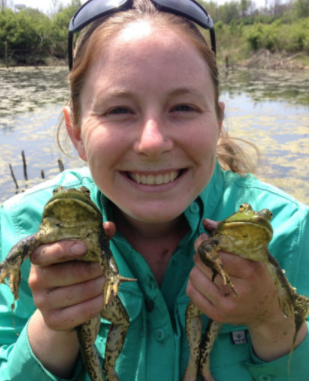 Michelle Cook is an Environmental Scientist with the Division of Water, within the Kentucky Department for Environmental Protection. In her role as Wetlands Program Coordinator, she oversees the development, validation, and implementation of wetland assessment methodologies including the Kentucky Wetland Rapid Assessment Method (KY-WRAM) and indices of biological integrity. Michelle is part of a team of scientists working to develop water quality standards for Kentucky’s wetlands. She has 10 years of experience in the wetlands monitoring and assessment field and holds a M.S. in Biology from Eastern Kentucky University, and a B.S. in Biological Sciences from Northern Kentucky University.
Michelle Cook is an Environmental Scientist with the Division of Water, within the Kentucky Department for Environmental Protection. In her role as Wetlands Program Coordinator, she oversees the development, validation, and implementation of wetland assessment methodologies including the Kentucky Wetland Rapid Assessment Method (KY-WRAM) and indices of biological integrity. Michelle is part of a team of scientists working to develop water quality standards for Kentucky’s wetlands. She has 10 years of experience in the wetlands monitoring and assessment field and holds a M.S. in Biology from Eastern Kentucky University, and a B.S. in Biological Sciences from Northern Kentucky University.
![]()
Improving Enforcement in Wetland Regulatory Programs
Held Tuesday, September 29, 2020 - 3:00pm-4:30 pm Eastern
INTRODUCTION
- Brenda Zollitsch, Senior Policy Analyst, Association of State Wetland Managers [POWERPOINT PRESENTATION]
PRESENTERS
- Yvonne Vallette, U.S. Environmental Protection Agency, Region 10 [POWERPOINT PRESENTATION]
- Stacia Bax, Missouri Department of Natural Resources [POWERPOINT PRESENTATION]
- Sara Slater, Oregon Department of Environmental Quality [POWERPOINT PRESENTATION]
ABSTRACT
This webinar discussed the need for enforcement mechanisms in wetland regulatory programs. After painting the broader background of need, the webinar shared some of the most common compliance and enforcement tools and their pros, cons and contexts for successful application. The webinar went on to discuss the relationship between states and tribes with the Corps in terms of coordination of enforcement activities. This portion of the webinar explored the different scenarios across the country from the Corps conducting all enforcement in a state to working to actively coordinate state enforcement with multiple districts. The webinar concluded with details about how to build enforcement capacity at the state/tribal level through Wetland Program Plans, specifically how these planning activities can develop systems or be designed to include enforcement in the future.
BIO
 Yvonne Vallette is an Aquatic Ecologist with the U.S. Environmental Protection Agency (EPA). For the last twenty-three years she has worked at EPA Region 10’s Oregon Operations Office in Portland serving as the Region’s coordinator for enhancing State and Tribal Programs. Her work with EPA is focused on the technical and policy aspects of the Clean Water Act (CWA), including Section 404. Her practicable experience includes work in: aquatic resource monitoring and assessment, 404 enforcement, compensatory mitigation, impact analysis, CWA jurisdiction, 404 program assumption, and aquatic resources restoration.
Yvonne Vallette is an Aquatic Ecologist with the U.S. Environmental Protection Agency (EPA). For the last twenty-three years she has worked at EPA Region 10’s Oregon Operations Office in Portland serving as the Region’s coordinator for enhancing State and Tribal Programs. Her work with EPA is focused on the technical and policy aspects of the Clean Water Act (CWA), including Section 404. Her practicable experience includes work in: aquatic resource monitoring and assessment, 404 enforcement, compensatory mitigation, impact analysis, CWA jurisdiction, 404 program assumption, and aquatic resources restoration.
 Stacia Bax is the Environmental Supervisor of the Stormwater and Certification Unit within the Missouri Department of Natural Resources. Stacia has nearly 20 years of experience with the department in various areas related to the water program and state parks, with the past 10+ years working with Section 401. For the past 7.5 years, Stacia has coordinated quarterly department-wide wetland meetings, which has helped in the development of the Wetland Program Plan document.
Stacia Bax is the Environmental Supervisor of the Stormwater and Certification Unit within the Missouri Department of Natural Resources. Stacia has nearly 20 years of experience with the department in various areas related to the water program and state parks, with the past 10+ years working with Section 401. For the past 7.5 years, Stacia has coordinated quarterly department-wide wetland meetings, which has helped in the development of the Wetland Program Plan document.
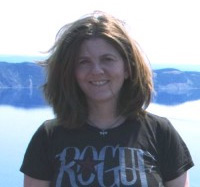 Sara Slater is the 401 Water Quality Coordinator for the Oregon Department of Environmental Quality. Prior to her work at Oregon DEQ, Sara served as Project Manager for Environmental Services Drainage utility in the City of Killeen, Texas. Her other experience includes serving as a program manager for Indiana State Department of Agriculture and Wetlands Project Manager at the Indiana Department of Environmental Management. Sara earned her MS in Geology from Purdue University in Indiana.
Sara Slater is the 401 Water Quality Coordinator for the Oregon Department of Environmental Quality. Prior to her work at Oregon DEQ, Sara served as Project Manager for Environmental Services Drainage utility in the City of Killeen, Texas. Her other experience includes serving as a program manager for Indiana State Department of Agriculture and Wetlands Project Manager at the Indiana Department of Environmental Management. Sara earned her MS in Geology from Purdue University in Indiana.
![]()
Conducting State/Tribal Review of the 2020 Nationwide Permits
Held Wednesday, September 16, 2020 - 3:00pm-5:00 pm Eastern
INTRODUCTION
- Brenda Zollitsch, Senior Policy Analyst, Association of State Wetland Managers [POWERPOINT PRESENTATION]
PRESENTERS
- David Olson, U.S. Army Corps of Engineers [POWERPOINT PRESENTATION] Timeline
- Panel of State Wetland Program Managers
- Dave Davis, Virginia Department of Environmental Quality
- Richard Mraz, Washington State Department of Ecology
ABSTRACT
September 15th and the 60-day review period clock has started ticking. Nationwide Permits (NWPs) authorize certain activities under Section 404 of the Clean Water Act and Section 10 of the Rivers and Harbors Act of 1899. The U.S. Army Corps of Engineers (Corps) is reissuing its existing NWPs and associated general conditions and definitions, with some modifications, as well as five new NWPs. The Corps is requesting comment on all aspects of these proposed nationwide permits. To view the Nationwide Permits in the Federal Register, go here.
This fifth webinar in ASWM’s Regulatory Capacity Building Webinar Series has been developed to help reviewers understand the content of the newly published Nationwides, options in the review process, and considerations related to specific proposed changes. David Olson from the Corps reviewed each of the proposed changes to the general conditions and introduce the five proposed new NWPs. After this content review, he was joined by state panelists who shared their approaches to the review process, specific elements of the proposed changes on which they are planning to comment, and lessons learned from their reviewing experiences in the past. The webinar ended with an opportunity for participants to ask the panel questions.
BIOS
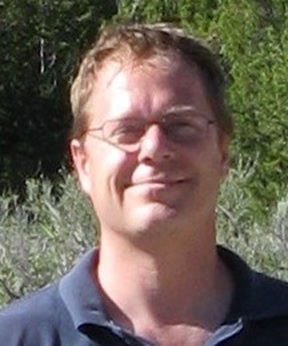 David Olson is a Regulatory Program Manager at the Headquarters office of the U.S. Army Corps of Engineers. He has worked for the Corps since 1991, beginning as a Regulatory Project Manager at the Baltimore District, evaluating applications for Department of the Army authorization to do work in waters and wetlands. In 2002, he began working at his current position at Corps Headquarters. His focus areas currently include wetland and stream restoration, the Corps’ nationwide permit program, and Endangered Species Act compliance for Department of the Army permits.
David Olson is a Regulatory Program Manager at the Headquarters office of the U.S. Army Corps of Engineers. He has worked for the Corps since 1991, beginning as a Regulatory Project Manager at the Baltimore District, evaluating applications for Department of the Army authorization to do work in waters and wetlands. In 2002, he began working at his current position at Corps Headquarters. His focus areas currently include wetland and stream restoration, the Corps’ nationwide permit program, and Endangered Species Act compliance for Department of the Army permits.
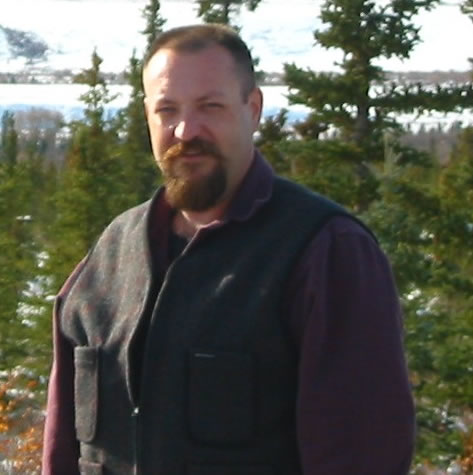 Dave Davis is the Director of the Office of Wetlands & Stream Protection at the Virginia Department of Environmental Quality. In this position, he is responsible for Virginia’s independent nontidal wetland regulatory program, non-regulatory wetland programs, and surface water investigation programs. He is DEQ’s lead technical expert on wetland science issues, drafts regulations and guidance on State wetland policy, serves as the liaison with federal agencies regarding 404/401 issues, and manages several federally-funded wetland grants. Prior to joining DEQ in 2001, Dave was a partner in a wetland consulting firm in Richmond. He holds a Bachelor of Science degree in Biology (Music minor) from The College of William & Mary and a Master of Environmental Studies degree in Environmental Policy and Administration from Virginia Commonwealth University. He is a certified Professional Wetland Scientist and a Virginia Certified Professional Wetland Delineator.
Dave Davis is the Director of the Office of Wetlands & Stream Protection at the Virginia Department of Environmental Quality. In this position, he is responsible for Virginia’s independent nontidal wetland regulatory program, non-regulatory wetland programs, and surface water investigation programs. He is DEQ’s lead technical expert on wetland science issues, drafts regulations and guidance on State wetland policy, serves as the liaison with federal agencies regarding 404/401 issues, and manages several federally-funded wetland grants. Prior to joining DEQ in 2001, Dave was a partner in a wetland consulting firm in Richmond. He holds a Bachelor of Science degree in Biology (Music minor) from The College of William & Mary and a Master of Environmental Studies degree in Environmental Policy and Administration from Virginia Commonwealth University. He is a certified Professional Wetland Scientist and a Virginia Certified Professional Wetland Delineator.
 Richard Mraz is the Wetland Policy Lead for the Washington Department of Ecology. He is a certified Professional Wetland Scientist who began his career in the wetlands field in Lee County, Florida in 1987. He has worked as a naturalist, field biologist and environmental planner with local, state and federal agencies since 1980. Rick has degrees in Geology, Field Biology and Philosophy.
Richard Mraz is the Wetland Policy Lead for the Washington Department of Ecology. He is a certified Professional Wetland Scientist who began his career in the wetlands field in Lee County, Florida in 1987. He has worked as a naturalist, field biologist and environmental planner with local, state and federal agencies since 1980. Rick has degrees in Geology, Field Biology and Philosophy.
![]()
Communications Strategies and Lessons Learned for Wetland Programs
Held Thursday, August 20, 2020 - 3:00-5:00 pm Eastern
INTRODUCTION
- Brenda Zollitsch, Senior Policy Analyst, Association of State Wetland Managers [POWERPOINT PRESENTATION]
PRESENTERS
- Alison Rogerson, Delaware Department of Natural Resources and Environmental Control [POWERPOINT PRESENTATION]
- Laura Lapierre, Vermont Department of Environmental Conservation [POWERPOINT PRESENTATION]
- Mary Ann Tilton, New Hampshire Department of Environmental Services [POWERPOINT PRESENTATION]
ABSTRACT
This webinar shared communication strategies and examples of their use in practice to strengthen wetland regulatory programs. Participants learned how various techniques can be employed in real-world contexts. Examples included strategies to gather input and build support for new or changing regulations, to work through stakeholder engagement activities, and to improve awareness of and compliance with new requirements. This webinar shared examples from three states actively engaged in this communications work. Presenters shared lessons learned and advice on how to think through and implement this work, as well as insights about common challenges.
BIOS
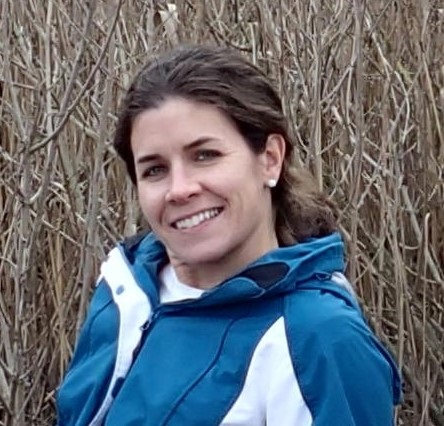 Alison Rogerson works for the Delaware Department of Natural Resources and Environmental Control’s Wetland Monitoring and Assessment Program which assesses the health of Delaware’s tidal and non-tidal wetlands, investigates shoreline stabilization and wetland restoration methods, and creates usable products to inform and teach stakeholders. Alison has been with DNREC for 12 years and has experience combining wetland science and research with outreach and education to strengthen wetland management and protection in Delaware.
Alison Rogerson works for the Delaware Department of Natural Resources and Environmental Control’s Wetland Monitoring and Assessment Program which assesses the health of Delaware’s tidal and non-tidal wetlands, investigates shoreline stabilization and wetland restoration methods, and creates usable products to inform and teach stakeholders. Alison has been with DNREC for 12 years and has experience combining wetland science and research with outreach and education to strengthen wetland management and protection in Delaware.
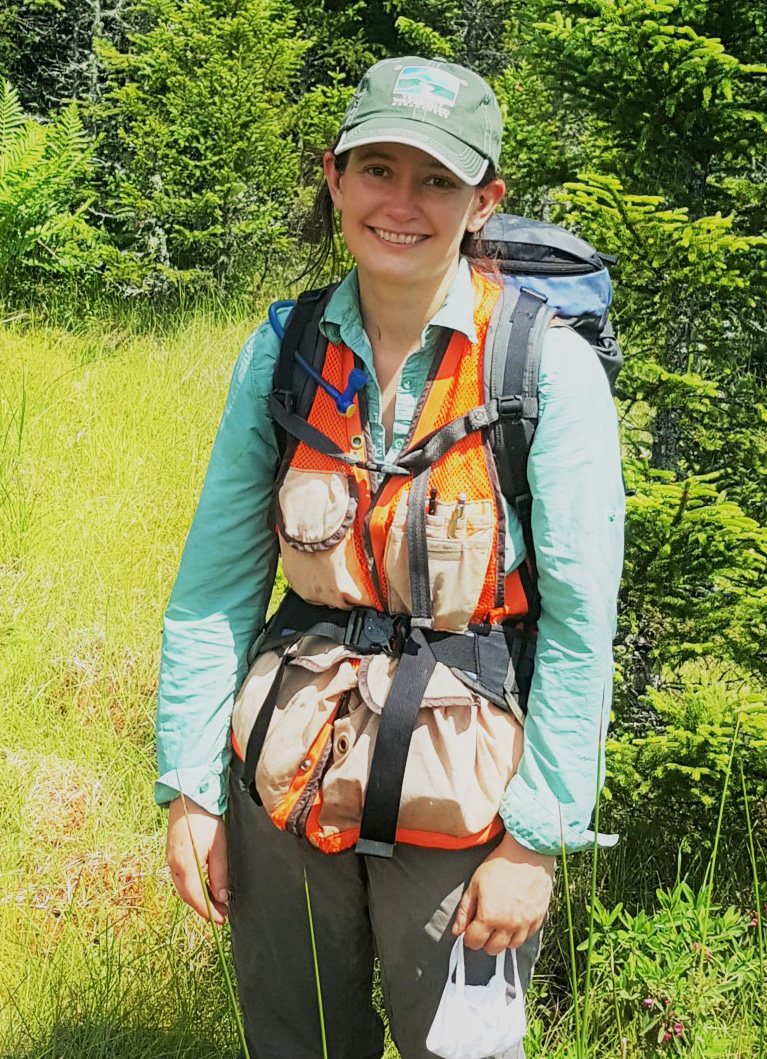 Laura Lapierre, PWS, NHCWS is the Program Manager of the Vermont Wetlands Program for the VT Department of Environmental Conservation and has held this role for nearly 7 years. At VT DEC, Laura is responsible for the management and protection of Vermont’s wetlands through the program’s implementation of the Vermont Wetland Rules, wetland bioassessment projects, wetland restoration work, and aiding in the development of state wetland policy. Laura has a Master’s Degree in Biology from McGill University.
Laura Lapierre, PWS, NHCWS is the Program Manager of the Vermont Wetlands Program for the VT Department of Environmental Conservation and has held this role for nearly 7 years. At VT DEC, Laura is responsible for the management and protection of Vermont’s wetlands through the program’s implementation of the Vermont Wetland Rules, wetland bioassessment projects, wetland restoration work, and aiding in the development of state wetland policy. Laura has a Master’s Degree in Biology from McGill University.
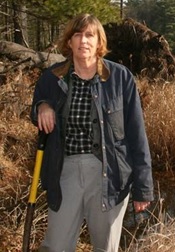 Mary Ann Tilton is the Assistant Wetlands Bureau Administrator with the State of New Hampshire, Department of Environmental Services (NHDES), Wetlands Bureau. She has been with NHDES for over 30 years in various management and supervisory positions. She helped develop the Wetlands Enforcement program and supervised wetlands compliance for 17 years. She has served as the Assistant Administrator since 2005 and oversees state wetlands rules development, program development, and wetlands permitting. She is the recipient of an EPA Merit Award (2019) for development of a Wetlands BMP, multi-year rules initiative, and development of stream crossing rules. She holds a BA degree in Botany and Zoology from Connecticut College, MS in Zoology from University of Rhode Island, and a JD from UNH Law School (formerly Franklin Pierce Law Center), and is a Professional Wetland Scientist (PWS) and member of the Society of Wetland Scientists. She lives with her family in Concord, NH and enjoys hiking in the White Mountains, skiing, and exploring arboretums.
Mary Ann Tilton is the Assistant Wetlands Bureau Administrator with the State of New Hampshire, Department of Environmental Services (NHDES), Wetlands Bureau. She has been with NHDES for over 30 years in various management and supervisory positions. She helped develop the Wetlands Enforcement program and supervised wetlands compliance for 17 years. She has served as the Assistant Administrator since 2005 and oversees state wetlands rules development, program development, and wetlands permitting. She is the recipient of an EPA Merit Award (2019) for development of a Wetlands BMP, multi-year rules initiative, and development of stream crossing rules. She holds a BA degree in Botany and Zoology from Connecticut College, MS in Zoology from University of Rhode Island, and a JD from UNH Law School (formerly Franklin Pierce Law Center), and is a Professional Wetland Scientist (PWS) and member of the Society of Wetland Scientists. She lives with her family in Concord, NH and enjoys hiking in the White Mountains, skiing, and exploring arboretums.
![]()
Building Capacity to Protect and Manage Wetlands through the Development of State Wetland Associations
Held Wednesday, June 24, 2020 - 3:00pm-4:30pm
INTRODUCTION
- Brenda Zollitsch, Senior Policy Analyst, Association of State Wetland Managers [POWERPOINT PRESENTATION]
PRESENTERS
- Erin O'Brien, Wisconsin Wetlands Association [POWERPOINT PRESENTATION]
- Rick Savage, Carolina Wetlands Association [POWERPOINT PRESENTATION]
- Kim Matthews, Carolina Wetlands Association [POWERPOINT PRESENTATION]
ABSTRACTS
This webinar shared how states and tribes can partner with or encourage the development of state wetland associations to enhance the capacity of states and tribes to protect their wetlands. State associations can be valuable partners with states and tribes on a range of activities, ranging from restoration activities and monitoring and assessment to stimulating financial investments and assisting with education and outreach. This webinar shared the experiences of the Wisconsin Wetland Association and the Carolinas Wetland Association, while also sharing some of the interesting connections states have with other associations. The webinar included basic information about what state wetland associations are, what roles they play, lessons learned by two example associations and some lessons learned to help those interested in forming a new state wetland association. The webinar included presentations by both associations, followed by a panel session and Q&A with webinar participants.
BIOS
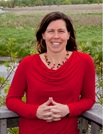 Erin O’Brien is the Policy Programs Director for the Wisconsin Wetlands Association (WWA). Since 2004, Erin has overseen the implementation and expansion of WWA's government relations work including lobbying, legislator education, regulatory oversight, local government outreach, and EPA funded wetland program development collaborations with university and municipal partners. Erin has a Master’s degree in Land Resources from University of Wisconsin-Madison. WWA recently celebrated its 50th anniversary. A timeline of its history can be found at Wisconsinwetlands.org/50years.
Erin O’Brien is the Policy Programs Director for the Wisconsin Wetlands Association (WWA). Since 2004, Erin has overseen the implementation and expansion of WWA's government relations work including lobbying, legislator education, regulatory oversight, local government outreach, and EPA funded wetland program development collaborations with university and municipal partners. Erin has a Master’s degree in Land Resources from University of Wisconsin-Madison. WWA recently celebrated its 50th anniversary. A timeline of its history can be found at Wisconsinwetlands.org/50years.
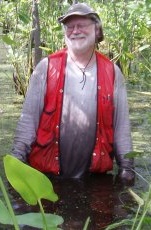 Rick Savage formed the Carolina Wetlands Association nonprofit in 2015 to maintain a public focus on the value of wetlands. He serves as the organization's president. Currently, Carolina Wetlands Association is working with communities to restore wetlands, create community resilience and environmental equity, to mitigate climate change effects and provide additional co-benefits in terms of ecosystem services. Prior to his work with the Carolina Wetlands Association, Rick worked for the North Carolina Department of Environment and Natural Resources in the Division of Water Quality, doing wetlands monitoring research for EPA. Rick worked with EPA scientists and other state scientists to develop the sampling protocols and coordinated regional assessment efforts for the National Wetland Condition Assessment. Rick has an MS in Systems Engineering from Virginia Tech and an MS in Natural Resource Management.
Rick Savage formed the Carolina Wetlands Association nonprofit in 2015 to maintain a public focus on the value of wetlands. He serves as the organization's president. Currently, Carolina Wetlands Association is working with communities to restore wetlands, create community resilience and environmental equity, to mitigate climate change effects and provide additional co-benefits in terms of ecosystem services. Prior to his work with the Carolina Wetlands Association, Rick worked for the North Carolina Department of Environment and Natural Resources in the Division of Water Quality, doing wetlands monitoring research for EPA. Rick worked with EPA scientists and other state scientists to develop the sampling protocols and coordinated regional assessment efforts for the National Wetland Condition Assessment. Rick has an MS in Systems Engineering from Virginia Tech and an MS in Natural Resource Management.
 Kim Matthews is the current Vice-President and founding board member of the volunteer-based non-profit organization, the Carolina Wetlands Association. She is also the chair of the Development Committee focusing on outreach, communication, and fundraising. Kim graduated with a B.S. in Biology from Wittenberg University. She received her M.S. in Forestry from North Carolina State University. She has over
Kim Matthews is the current Vice-President and founding board member of the volunteer-based non-profit organization, the Carolina Wetlands Association. She is also the chair of the Development Committee focusing on outreach, communication, and fundraising. Kim graduated with a B.S. in Biology from Wittenberg University. She received her M.S. in Forestry from North Carolina State University. She has over
20 years of experience in wetland ecology, stormwater management, and watershed assessments. She is currently an environmental scientist with RTI, International where she provides technical support and assistance to federal and state environmental agencies.
![]()
Sharing EPA's "Refresh" to the Enhancing State and Tribal Programs (ESTP) Framework
Held Tuesday, March 24, 2020 - 3-5:00 pm ET
INTRODUCTION
Brenda Zollitsch, Association of State Wetland Managers [POWERPOINT PRESENTATION]
PRESENTERS
- Rebecca Dils, U.S. Environmental Protection Agency, Office of Wetlands, Oceans and Watersheds [INTRO: POWERPOINT PRESENTATION]
- Michael McDavit, U.S. Environmental Protection Agency, Office of Wetlands, Oceans and Watersheds [INTRO: POWERPOINT PRESENTATION]
- Kerryann Weaver, U.S. Environmental Protection Agency, Region 5 [POWERPOINT PRESENTATION]
- Yvonne Vallette, U.S. Environmental Protection Agency, Region 10[POWERPOINT PRESENTATION]
- Eliodora Chamberlain, U.S. Environmental Protection Agency, Region 7 [POWERPOINT PRESENTATION]
ABSTRACT
This webinar shared information on forthcoming updates to the EPA’s Enhancing State and Tribal Programs (ESTP) Framework. EPA’s ESTP Framework is designed to enhance EPA's delivery of technical and financial support for state and tribal wetlands programs. The overall objective of the ESTP initiative is to accelerate program development on a national scale.
The webinar provided a brief introduction and background on EPA’s ESTP Initiative and how it relates to wetland program planning and capacity building efforts. The webinar then move to presentations on the “refreshes” being made in each of the four core element areas addressed in the ESTP Framework: 1) wetland monitoring and assessment, 2) wetland regulation, 3) wetland water quality standards, and 4) voluntary wetland restoration and protection. The webinar encourages states and tribes to utilize the framework as a planning tool to build state and tribal wetland program capacity. The webinar ended with an invitation for state and tribal wetland staff to participate in ASWM’s capacity building National Dialogues and an overview of ASWM resources around this topic.
BIOS
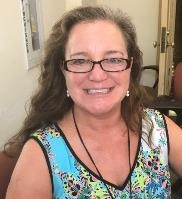 Rebecca Dils is a long-time employee of the U.S. Environmental Protection Agency and has worked as a regional and state liaison in numerous programs including Toxic Release Inventory Community Right-to-Know, State & Local Comparative Risk, Coalition to Restore Urban Waterways, and Indiana’s eCnter for Urban Policy and the Environment. One of her favorite projects was being a team leader for the Conservation Core and At-Risk Youth Environmental Program in Richmond, California. She is currently working on the ESTP Wetlands Program with a zeal for the Voluntary Restoration & Protection Core Element.
Rebecca Dils is a long-time employee of the U.S. Environmental Protection Agency and has worked as a regional and state liaison in numerous programs including Toxic Release Inventory Community Right-to-Know, State & Local Comparative Risk, Coalition to Restore Urban Waterways, and Indiana’s eCnter for Urban Policy and the Environment. One of her favorite projects was being a team leader for the Conservation Core and At-Risk Youth Environmental Program in Richmond, California. She is currently working on the ESTP Wetlands Program with a zeal for the Voluntary Restoration & Protection Core Element.
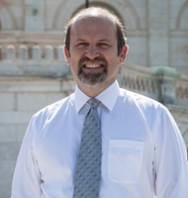 Michael McDavit is currently the Chief of the Program Development and Jurisdiction Branch, Office of Wetlands, Oceans and Watersheds, U.S. Environmental Protection Agency. His unit oversees “Waters of the US” jurisdictional matters under the Clean Water Act and administers technical/financial assistance for enhancing state and tribal aquatic resource programs. His team is currently working on a number of rulemaking projects, including Waters of the US (WOTUS) definition rulemaking, state and tribal 404 permitting regulations, and guidance/regulation on the section 401 water quality certification process. Mike holds a BS in Environmental Science from the University of Wisconsin at Green Bay and a MPA from The George Washington University. His 37-year federal career has spanned many environmental functions, including regulation of pesticides, management of hazardous waste, and air and water pollution control.
Michael McDavit is currently the Chief of the Program Development and Jurisdiction Branch, Office of Wetlands, Oceans and Watersheds, U.S. Environmental Protection Agency. His unit oversees “Waters of the US” jurisdictional matters under the Clean Water Act and administers technical/financial assistance for enhancing state and tribal aquatic resource programs. His team is currently working on a number of rulemaking projects, including Waters of the US (WOTUS) definition rulemaking, state and tribal 404 permitting regulations, and guidance/regulation on the section 401 water quality certification process. Mike holds a BS in Environmental Science from the University of Wisconsin at Green Bay and a MPA from The George Washington University. His 37-year federal career has spanned many environmental functions, including regulation of pesticides, management of hazardous waste, and air and water pollution control.
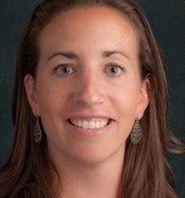 Kerryann Weaver is an Environmental Scientist with the U.S. Environmental Protection Agency's Region 5 Office in Chicago. She works in the Watersheds and Wetland Branch of the Water Division. Kerryann is involved with Clean Water Act Section 404 permit review and enforcement, as well as wetland mitigation banking, wetland program contract and grant review and management. Kerryann managed the development of the Wetland Supplement.
Kerryann Weaver is an Environmental Scientist with the U.S. Environmental Protection Agency's Region 5 Office in Chicago. She works in the Watersheds and Wetland Branch of the Water Division. Kerryann is involved with Clean Water Act Section 404 permit review and enforcement, as well as wetland mitigation banking, wetland program contract and grant review and management. Kerryann managed the development of the Wetland Supplement.
 Yvonne Vallette is an Aquatic Ecologist with the U.S. Environmental Protection Agency (EPA). For the last twenty-three years she has worked at EPA Region 10’s Oregon Operations Office in Portland serving as the Region’s coordinator for enhancing State and Tribal Programs. Her work with EPA is focused on the technical and policy aspects of the Clean Water Act (CWA), including Section 404. Her practicable experience includes work in: aquatic resource monitoring and assessment, 404 enforcement, compensatory mitigation, impact analysis, CWA jurisdiction, 404 program assumption, and aquatic resources restoration.
Yvonne Vallette is an Aquatic Ecologist with the U.S. Environmental Protection Agency (EPA). For the last twenty-three years she has worked at EPA Region 10’s Oregon Operations Office in Portland serving as the Region’s coordinator for enhancing State and Tribal Programs. Her work with EPA is focused on the technical and policy aspects of the Clean Water Act (CWA), including Section 404. Her practicable experience includes work in: aquatic resource monitoring and assessment, 404 enforcement, compensatory mitigation, impact analysis, CWA jurisdiction, 404 program assumption, and aquatic resources restoration.
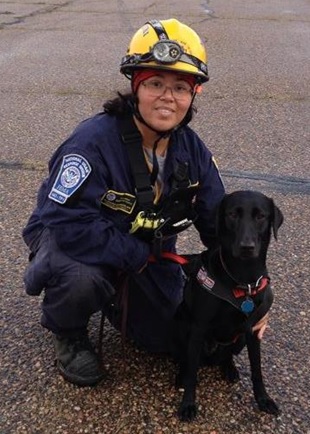 Dr. Eliodora Chamberlain graduated with a B.S. in Zoology from the University of California, Davis. She received her M.S. and Ph.D. in Wildlife Behavior and Physiological Ecology from the University of Missouri-Columbia in the Department of Fisheries and Wildlife Sciences and the USGS Fish and Wildlife Cooperative Research Extension Unit.
Dr. Eliodora Chamberlain graduated with a B.S. in Zoology from the University of California, Davis. She received her M.S. and Ph.D. in Wildlife Behavior and Physiological Ecology from the University of Missouri-Columbia in the Department of Fisheries and Wildlife Sciences and the USGS Fish and Wildlife Cooperative Research Extension Unit.
After working 17 years in wildlife research, US Fish and Wildlife Service, USDA Forest Service, she started working for the US EPA Region 7 in 2005. She works in the Watersheds and Grants Branch in the Water Division as a Wetlands and Streams Biologist and wears several hats. She is the Lead Regional Coordinator for ESTP & NWCA, and is the Regional Team Leader for the CWA 404 Regulatory section.
When she is not working for the EPA, she is a Canine Search Specialist with FEMA’s Missouri Task Force 1 Urban Search and Rescue Canine Team, a FEMA K9 Lead Evaluator, and a FEMA K9 Instructor. She currently has a FEMA certified disaster search and rescue dog, Phoenix, and is currently training her pup, Raven, to be a future FEMA disaster search and rescue dog.
![]()
Introduction to Wetland Program Plans (WPPs)
Held Friday, February 21, 2020 - 3:00-5:00 pm EST
INTRODUCTION
Brenda Zollitsch, Association of State Wetland Managers [POWERPOINT PRESENTATION]
PRESENTERS
- Yvonne Vallette, U.S. Environmental Protection Agency, Region 10 [POWERPOINT PRESENTATION]
- Richard Mraz, Washington State Department of Ecology [POWERPOINT PRESENTATION]
- Stacia Bax, Missouri Department of Natural Resources [POWERPOINT PRESENTATION]
- Brenda Zollitsch, Association of State Wetland Managers [POWERPOINT PRESENTATION]
ABSTRACT
This first webinar in ASWM’s Wetland Regulatory Capacity Building Webinar Series focused on the use of Wetland Program Plans (WPPs) as a tool that can help states and tribes identify and plan capacity building efforts. WPPs focus on four core elements – wetland regulation, wetland monitoring and assessment, wetland water quality standards, and voluntary wetland restoration, but can include other efforts as well. In the first presentation, the webinar shared how WPPs can be used as one of (many) different capacity building tools and explain the components and expectations around their development. Next, the webinar shared examples of two state WPPs, each taking a different approach to fulfilling the required elements of a WPP. The webinar shares additional benefits of WPPs, including improved coordination with partners, measurable objectives to guide and track ongoing work and access to funding sources, including EPA Wetland Program Development Grants (WPDGs). The webinar concluded with an invitation to engage in ASWM’s national dialogues and share upcoming project resources that may be useful to states and tribes seeking to build the capacity of their wetland programs.
BIOS
 Yvonne Vallette is an Aquatic Ecologist with the U.S. Environmental Protection Agency (EPA). For the last twenty-three years she has worked at EPA Region 10’s Oregon Operations Office in Portland serving as the Region’s coordinator for enhancing State and Tribal Programs. Her work with EPA is focused on the technical and policy aspects of the Clean Water Act (CWA), including Section 404. Her practicable experience includes work in: aquatic resource monitoring and assessment, 404 enforcement, compensatory mitigation, impact analysis, CWA jurisdiction, 404 program assumption, and aquatic resources restoration.
Yvonne Vallette is an Aquatic Ecologist with the U.S. Environmental Protection Agency (EPA). For the last twenty-three years she has worked at EPA Region 10’s Oregon Operations Office in Portland serving as the Region’s coordinator for enhancing State and Tribal Programs. Her work with EPA is focused on the technical and policy aspects of the Clean Water Act (CWA), including Section 404. Her practicable experience includes work in: aquatic resource monitoring and assessment, 404 enforcement, compensatory mitigation, impact analysis, CWA jurisdiction, 404 program assumption, and aquatic resources restoration.
 Rick Mraz is the Wetland Policy Lead for the Washington Department of Ecology. He is a certified Professional Wetland Scientist who began his career in the wetlands field in Lee County, Florida in 1987. He has worked as a naturalist, field biologist and environmental planner with local, state and federal agencies since 1980. Rick has degrees in Geology, Field Biology and Philosophy
Rick Mraz is the Wetland Policy Lead for the Washington Department of Ecology. He is a certified Professional Wetland Scientist who began his career in the wetlands field in Lee County, Florida in 1987. He has worked as a naturalist, field biologist and environmental planner with local, state and federal agencies since 1980. Rick has degrees in Geology, Field Biology and Philosophy
 Stacia Bax is the Environmental Supervisor of the Stormwater and Certification Unit within the Missouri Department of Natural Resources. Stacia has nearly 20 years of experience with the department in various areas related to the water program and state parks, with the past 10+ years working with Section 401. For the past 7.5 years, Stacia has coordinated quarterly department-wide wetland meetings, which has helped in the development of the Wetland Program Plan document.
Stacia Bax is the Environmental Supervisor of the Stormwater and Certification Unit within the Missouri Department of Natural Resources. Stacia has nearly 20 years of experience with the department in various areas related to the water program and state parks, with the past 10+ years working with Section 401. For the past 7.5 years, Stacia has coordinated quarterly department-wide wetland meetings, which has helped in the development of the Wetland Program Plan document.
View Past Wetland Regulatory Capacity Building Webinars Here
| 2021 |
View a List of Wetland Regulatory Capacity Building Webinar Recordings Here
